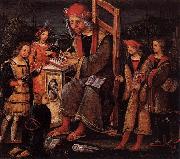China al por mayor de Marco de Oleo |
|||||||||||

|
|||||||||||
|
|
|
||||||||||||||
|
Amico Aspertini
(c. 1474 - 1552) is an Italian Renaissance painter whose complex, eccentric, and eclectic style anticipates Mannerism. He is considered among the first of the Bolognese School of painting. He was born in Bologna to a family of painters (Guido Aspertini and Giovanni Antonio Aspertini, his father), and studied under masters such as Lorenzo Costa and Francesco Francia. He is briefly documented in Rome between 1500 - 1503, returning to Bologna and painting in a style influenced by Pinturicchio. In Bologna in 1504, he joined Francia and Costa in painting frescoes for the newly restored Oratory of Santa Cecilia in San Giacomo Maggiore, a work commissioned by Giovanni II Bentivoglio. In 1507-09, he painted a fresco cycle in San Frediano in Lucca. Asperini painted in 1508-1509 the splendid frescoes in the Chapel of the Cross in the Basilica di San Frediano in Lucca. Aspertini was also one of two artists chosen to decorate a triumphal arch for the entry into Bologna of Pope Clement VII and Emperor Charles V in 1529. |
||||||||||||||
|
|
||||||||||||||
|
||||||||||||||
|
|
||||||||||||||
| Amico Aspertini
(c. 1474 - 1552) is an Italian Renaissance painter whose complex, eccentric, and eclectic style anticipates Mannerism. He is considered among the first of the Bolognese School of painting. He was born in Bologna to a family of painters (Guido Aspertini and Giovanni Antonio Aspertini, his father), and studied under masters such as Lorenzo Costa and Francesco Francia. He is briefly documented in Rome between 1500 - 1503, returning to Bologna and painting in a style influenced by Pinturicchio. In Bologna in 1504, he joined Francia and Costa in painting frescoes for the newly restored Oratory of Santa Cecilia in San Giacomo Maggiore, a work commissioned by Giovanni II Bentivoglio. In 1507-09, he painted a fresco cycle in San Frediano in Lucca. Asperini painted in 1508-1509 the splendid frescoes in the Chapel of the Cross in the Basilica di San Frediano in Lucca. Aspertini was also one of two artists chosen to decorate a triumphal arch for the entry into Bologna of Pope Clement VII and Emperor Charles V in 1529. first half of 16th century cyf |
||||||||||||||
|
Related Paintings to Amico Aspertini :. |
||||||||||||||
|
|
||||||||||||||
|
|
||||||||||||||
|
CONTACTE EEUU |







